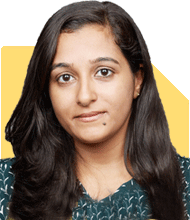Praseeja Nambiar | Answer |Ask -Follow
Career Counselling Expert - Answered on Jul 04, 2023
In the last nine years, she has helped over 1,000 students with their admissions into Indian and international universities.
Nambiar received her training from Global Career Counselling and the University of California, LA (UCLA) Extension and is certified as a career coach by Certified Career Services Provider.
She contributes to the International Career and College Counselling institute by training other counsellors across the globe.
Nambiar is also an evaluator for the Council of International Schools and will soon be leading the IB careers-related programme at Stonehill International School.... more

Hi, I had complete my Higher Secondary School , Science (PCM) with 68% Which Diploma Course should i can opted for my future career
What are your interests in class and outside class:
Do you enjoy research ?
I suggest you take a career aptitude test to better understand personality, interest, career orientation, and aptitude.
You may like to see similar questions and answers below
Radheshyam Zanwar |6731 Answers |Ask -Follow
MHT-CET, IIT-JEE, NEET-UG Expert - Answered on May 23, 2025
Nayagam P P |10849 Answers |Ask -Follow
Career Counsellor - Answered on Aug 29, 2025
Ulhas Joshi |280 Answers |Ask -Follow
Mutual Fund Expert - Answered on Dec 05, 2025
Dr Dipankar Dutta |1835 Answers |Ask -Follow
Tech Careers and Skill Development Expert - Answered on Dec 04, 2025
Ravi Mittal |676 Answers |Ask -Follow
Dating, Relationships Expert - Answered on Dec 04, 2025
Anu Krishna |1745 Answers |Ask -Follow
Relationships Expert, Mind Coach - Answered on Dec 04, 2025
Anu Krishna |1745 Answers |Ask -Follow
Relationships Expert, Mind Coach - Answered on Dec 04, 2025
Mayank Chandel |2562 Answers |Ask -Follow
IIT-JEE, NEET-UG, SAT, CLAT, CA, CS Exam Expert - Answered on Dec 04, 2025
Mayank Chandel |2562 Answers |Ask -Follow
IIT-JEE, NEET-UG, SAT, CLAT, CA, CS Exam Expert - Answered on Dec 04, 2025
Mayank Chandel |2562 Answers |Ask -Follow
IIT-JEE, NEET-UG, SAT, CLAT, CA, CS Exam Expert - Answered on Dec 04, 2025
Mayank Chandel |2562 Answers |Ask -Follow
IIT-JEE, NEET-UG, SAT, CLAT, CA, CS Exam Expert - Answered on Dec 04, 2025
Mayank Chandel |2562 Answers |Ask -Follow
IIT-JEE, NEET-UG, SAT, CLAT, CA, CS Exam Expert - Answered on Dec 04, 2025
























